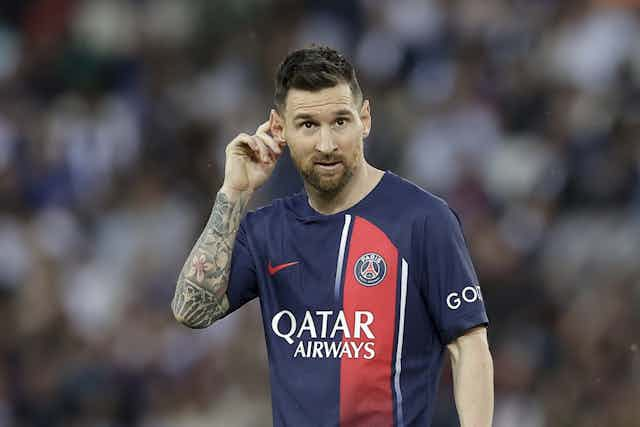Few would doubt Lionel Messi’s impact on European football. The scorer of 474 goals during his long career at Barcelona, he has been named the best footballer in the world a record seven times.
Now we are about to see what impact Messi will have on football in America. For the Argentinian, who has spent the last two seasons playing for Paris Saint-Germain, has decided not to accept offers to play in Saudi Arabia, and is joining Inter Miami in Florida instead.
This could turn out to be a massive turning point for the sport in the US. Messi has global appeal, and millions of fans will likely take a new interest in Major League Soccer (MLS) when one of the greatest players of all time is part of it.
Among Messi’s newest supporters are two of the world’s biggest companies, Apple and Adidas, who are reportedly working in partnership with Inter Miami and MLS as part of the deal.
Suggested details include Messi receiving a share of Inter Miami club merchandise from Adidas, and some of the revenue from Apple’s “Season Pass”, a streaming subscription which gives viewers access to every MLS game. The pass, which costs £14.99 a month, or £99 a season in the UK, launched in February 2023, in a 10-year deal worth US$2.5 billion (£1.9 billion) to the league.
And Apple’s involvement doesn’t end there. Just before Messi’s move was made public, Apple TV announced a four-part documentary series about the star, featuring behind the scenes coverage of the men’s 2022 Fifa World Cup, which Argentina won.
So Apple seem to think Messi is worthy of major investment. For their part, MLS are likely to offer Messi shares in Inter Miami, which is part-owned by former Manchester United player David Beckham. And it was arguably Beckham who paved the way for the kind of creative deal Messi looks set to enjoy.
Spend it like Beckham
For when Beckham joined LA Galaxy from Real Madrid in 2007, his deal included a share of shirt and ticket sales, something no MLS side had ever done before. It also included the chance to buy an MLS team for a reduced fee – which ended up in his shared ownership of Inter Miami.
Beckham was the league’s first “designated player” – a name for squad players (a maximum of three per side) who are signed up without being subject to league rules on salary caps. This means they are often highly paid.
Messi is expected to earn US$54 million a year, US$46 million more than the league’s next highest paid player (Chicago Fire’s Xherdan Shaqiri).
In return for those kind of salaries, designated players are expected to attract fans and ticket sales. There is research which suggests that Beckham’s arrival in the MLS increased ticket sales by 55%.
Other research says he was a key part of match attendance increasing by 65% across the league, with the addition of hundreds of thousands of new fans. The “Beckham effect” was greatest for LA Galaxy away games, which saw the biggest increase in attendance.
So the theory seems to be that big stars like Messi and Beckham, can benefit the whole league. Saudi Arabia is pursuing a similar strategy, splashing out on the likes of Cristiano Ronaldo and Karim Benzema to add talent and fame to the country’s league.
But the return on these investments is not guaranteed. Recent research on the impact of designated players on MLS found them to have a smaller impact than previously thought. One study even concluded that they had no impact at all on match attendance.
Research also reveals that once fans had seen Beckham play for LA Galaxy, the sense of novelty decreased over time. Attendance was highest during the first year of his six years in the league.
The same may turn out to be true for Messi. For now though, tickets for games involving Inter Miami are selling out. And for football in America (not to be confused with American football of course) the timing could turn out to be perfect.
The next men’s Fifa World Cup in 2026, will be held in the US, Canada and Mexico, marking a golden opportunity for MLS and the US Soccer Federation to expand the game’s domestic appeal.
To do that, MLS and Inter Miami will need to try to manage and maximise Messi’s impact. Apple, meanwhile, will simply be hoping Messi continues to produce the skill that has won him so many fans – and that those fans think his American journey is worth the price of another streaming subscription.

